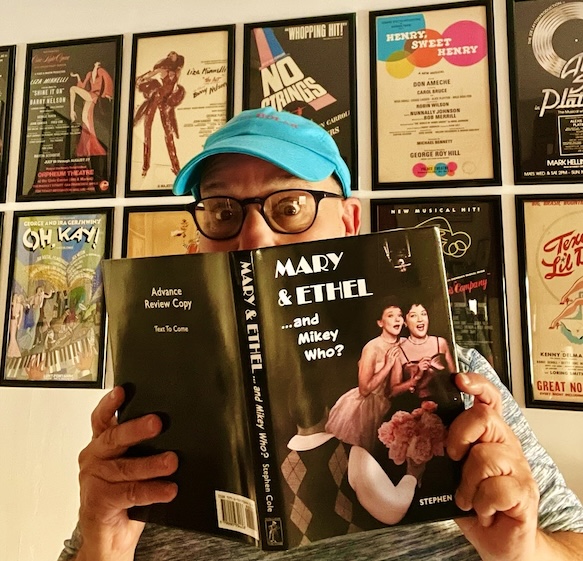By Ron Fassler. . . .
Stephen Cole has had a life in the theatre that has rewarded him many times over by way of writing the books and lyrics for a number of original musicals. Invested in show business from the time he was a child, he had the perspicacity as a teenager to befriend Ethel Merman in her later years. By virtue of their relationship, he also got to know Mary Martin. The pair, competitive for which one had bragging rights as the greatest musical theatre actress of their day, have been gone a long time now. It’s sad to think there are young actors coming up who aren’t aware of how bright their stars once shone. To memorialize that, as well as bring awareness of who they were and the orbit with which they reigned, Cole has written a book. And rather than write a truth-based biographical memoir he’s written a fanciful one. He’s also had the audacity to put a young man very much like himself smack in the center of it who he names Mikey Marvin Minkus, a nice Jewish boy from Brooklyn in love with the theatre. Add a closet that can transport the young man back in time to interact with his heroes and the result is Mary & Ethel… and Mikey Who?, available for purchase in January (in time for Ethel Merman’s birthday).
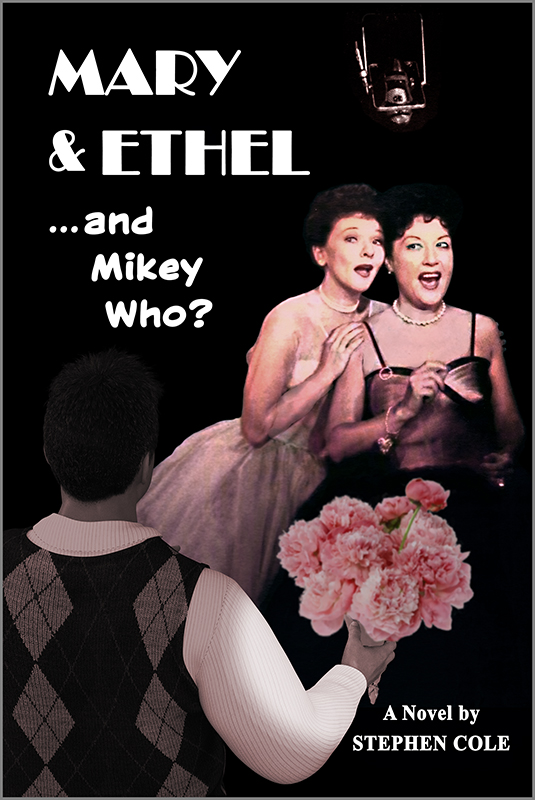
In advance of its publication, I had the chance to read it and interview the author about what stirred his imagination for this mix of fact and fiction. Here are some highlights:
RON FASSLER: Congratulations on a great job, Stephen. I’m wondering that since it’s somewhat fictionalized in your book, can you tell the story of how you really befriended Ethel Merman while still a teenager?
STEPHEN COLE: Ever since hearing Merman’s Gypsy, I became a fan. I had been an actor, but when my child roles dried up, I decided to become a producer (easy, right?) and after having seen Merman do one of her famous symphony concerts, I was determined to produce one on the then infant cable networks, CBS Cable. I brazenly called Ethel Merman’s concert manager and incredibly, he told me that if I could get it together I could shoot her Carnegie Hall debut, one year from then.
I had a couple of friends in the biz to advise me and in no time I had sent a proposal to J. Walter Thompson Advertising proposing a Kraft Music Hall. One evening my phone rang and the president of the company was on the line to say, “Yes, Kraft will sponsor it and you can go to CBS Cable and pitch it.” We pitched it, they accepted and then two months before the concert they went under and we were left with no money to shoot the concert. HBO and Showtime had no interest.
Meanwhile for the last year, Ethel’s manager, Bob Gardiner, became my friend, coming to my apartment to see rare videos of Merman. He invited me to Carnegie Hall to see the concert and, having told Ethel all about my rare videos, I was ushered back to meet her. “I’m coming to your house!” boomed the great voice. Two days later, she and her son got out of a cab on 9th Avenue and had dinner and watched videos of her from 50 years prior. (Ethel: “You see me there? That was 1966 and I wasn’t wearing a bra! If I did that now, they would hit the floor!”) After that she invited all her friends to my house for monthly parties to celebrate… HER! 9th Avenue shook with delight. It was like living in the That Girl episode over and over. It was the beginning of a great friendship that lasted till her death.
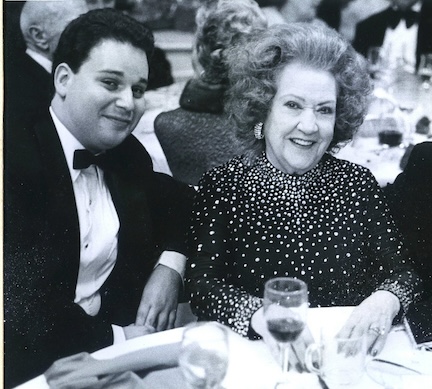

RF: You’ve written about Merman before (a musical Merman’s Apprentice) and extensive liner notes for Mermania 1 & 2, must-have CD’s for any fan of her work (it includes 29 recordings from her private collection). What made you go back to the well one more time?
SC: My personal Mermania seems to never end. I knew I had stories that no one else had and I didn’t want to write yet one more biography. After fourteen produced musicals and five published non-fiction books, I wanted to see how I could do with fiction. At first it was just a fictionalized version of their lives as they crossed. . . the tale of a rivalry and friendship, but it was not until I created Mikey Marvin Minkus and the time travel element that it became clear that this would be a whole new way to worship at the shrine. Am I done with Ethel yet? Well, there should be a mini-series based on this, right?
RF: You credit a friend for coming up with the notion to insert a version of yourself as a young man into the novel. Obviously, it made things more personal for you but in what other ways did this change your approach to writing it? What surprised you along the way while digging deep into your own past as well as those of these two women?
SC: The wonderful surprise after I put Mikey into it was when I realized that if you are going back in the past being hurled into different times, from 1938 back to the 80s, you might meet yourself and be able to help the young you. This became the through-line and climax of the story. Mikey gets to be in 1970 when he works for Merman and gets to give a gift to himself and his dying father… house seats to the historic performance of Hello, Dolly! So, the day it became the longest running Broadway musical was also the day that Mikey and his father bonded… over a musical.
RF: Did you ever think of the novel Ragtime while writing this? Was it an influence at all?
SC: I never did think of Ragtime at all. But the idea of putting fictional characters into real characters’ lives or visa-versa has always been fun for me. I did it in Merman’s Apprentice and then again my latest musical with David Krane, Goin’ Hollywood.
RF: No spoiler alert here, but there is also a Field of Dreams aspect to the fantasy of your book. That concludes with a dead father reconnecting with his son. Without giving too much away, do you want to comment on when that became part of the story you wanted to tell?
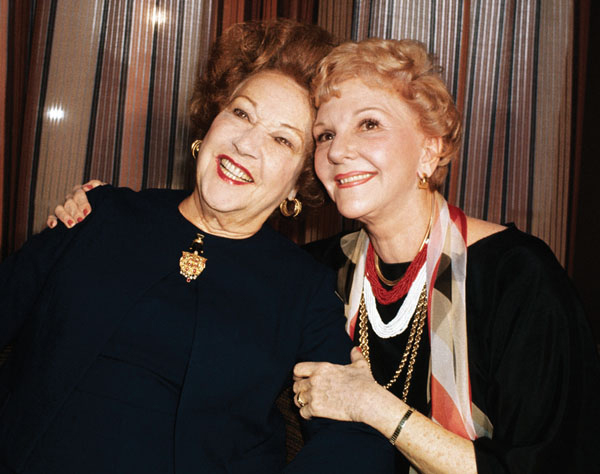

SC: I love how you are connecting me with other great fiction. The story starts with Mikey living in his mother’s basement playing the ten inch record of Merman and Martin’s Ford 50th Anniversary appearance, banished by the widow Minkus who is not a happy creature at that time in the early 1980s. How will he escape that world of “theatre-nerd” and have a life? As I wrote and came up with the sequence when Mikey could meet his late father and they could both help young Mikey understand and connect better before it was too late, I was moved. My real father lived a great long life and, although my mother did wear toilet paper on her hair, she was not Rifka, although she did call Merman “your girlfriend.” Still there are many aspects of them in the characters and their relationship to young Mikey. It all seemed right once I got to that point in the story. And it moved me greatly to write what might have been a wish fulfillment.
RF: A personal favorite sequence of mine in your book is how you recreate the 1960 Tony Awards when Merman and Martin were up against each other for their performances in Gypsy and The Sound of Music respectively. It comes off like a kid in a candy store opened after hours with everything available to eat. How much fun for you was coming up with all that?
SC: I loved writing about the Tony Awards. How lucky for us that it is available to view. Before Alex Cohen and 1967 when the Tonys went on national TV, it had only been a local event. It became clear to me watching that Merman was not there and that sparked my imagination. Where was she? Why was she not in the ballroom if she was nominated? All is revealed in the book and we get to have a great scene at Ethel’s apartment with some of my favorite of her friends, two of whom came to my apartment with her: Benay Venuta, Maria Karnilova. . . I missed meeting Dorothy Fields by a decade. Of course, everything at the Tonys is real, except when it’s not.
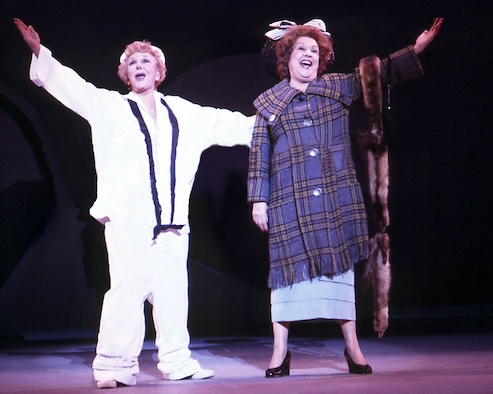

RF: Exactly. Your affection for the era of Merman and Martin is palpable. It feels as if that had more to do with the overall motivation for writing your book more than anything else. Can you expand on that a bit?
SC: Merman and Martin were the two greatest stars of the Broadway musical. They were bigger than life and, to me, represented all that was fabulous about musicals. They ushered me into this world, listening to those records, even watching the films (Mary made a lot of movies!). To me, and to Mikey, they ARE Broadway. They are what is missing now. That great big freak show where they could be one of a kind, not cookie cutter, never really replaceable (although they were replaced on the stage and in films). Original! How can we ever know what a great impact the Broadway musical once had? We can travel back with Mikey to the Imperial theatre to see Mary Martin stop the show with “My Heart Belongs to Daddy.” We can go behind the scenes of Mary’s run-thru of her Annie Get Your Gun tour and see how Merman felt watching someone replace HER. We can go into the real lives of these ladies, their loves, their marriages, what they gave up to be the two greatest stars that Broadway will ever know. This is why Mikey gets to go back and how they can influence him to know that musicals are important. They change his life and his father’s life and I hope those two broads in heaven realize what they have left behind. And, oh yeah, it’s fun! Remember fun? That’s why I wrote the book.
Mary & Ethel… and Mikey Who? has a publishing date of January 16, 2024. Pre-orders are available now athttp://bit.ly/Mary-Ethel.


